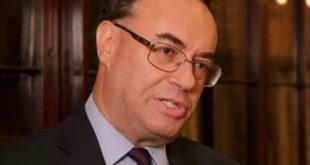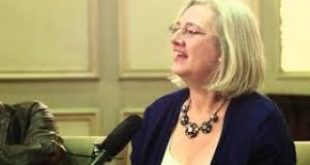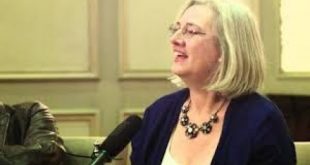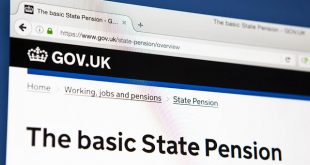"Britain nearly went bust in March, says Bank of England", reads a headline in the Guardian. In similar vein, the Telegraph's Business section reports "UK finances were close to collapse, says Governor":Eh, what? The Governor of the Bank of England says the UK nearly turned into Venezuela? Well, that's what the Telegraph seems to think: The Bank of England was forced to save the Government from potential financial collapse as markets seized up at the height of the coronavirus crisis,...
Read More »Britain was not “nearly bust” in March
"Britain nearly went bust in March, says Bank of England", reads a headline in the Guardian. In similar vein, the Telegraph's Business section reports "UK finances were close to collapse, says Governor":Eh, what? The Governor of the Bank of England says the UK nearly turned into Venezuela? Well, that's what the Telegraph seems to think: The Bank of England was forced to save the Government from potential financial collapse as markets seized up at the height of the coronavirus crisis,...
Read More »Frances Coppola on People’s QE and the effectiveness of central bank policies
Paul Buitink talks to Frances Coppola, economics and finance writer and author of the Case for People's Quantitative Easing. Frances used to work for banks but has been writing fulltime since 2002. Frances explains what quantitative easing (QE) is and what's good and bad about it. It can help to avoid debt deflation but at the same time benefits the rich, because the trickle down effect is limited. Central banks seem to be able to do only thing: buy more things. Frances explains the...
Read More »Frances Coppola on People’s QE and the effectiveness of central bank policies
Paul Buitink talks to Frances Coppola, economics and finance writer and author of the Case for People's Quantitative Easing. Frances used to work for banks but has been writing fulltime since 2002. Frances explains what quantitative easing (QE) is and what's good and bad about it. It can help to avoid debt deflation but at the same time benefits the rich, because the trickle down effect is limited. Central banks seem to be able to do only thing: buy more things. Frances explains the...
Read More »The true story of NI autocredits
There's yet another bizarre claim doing the rounds in Waspiland. Or, more correctly, among the hardline Back to 60 fringe of the broader women's state pension movement. I try to ignore most of the ridiculous claims made by Back to 60 campaigners, because they aren't going to listen to me and I will simply end up with a sore head and a very frayed temper. But this one is more complex - and confusing - than most, and it doesn't only affect women. So it is worth explaining. As always, the story...
Read More »The true story of NI autocredits
There's yet another bizarre claim doing the rounds in Waspiland. Or, more correctly, among the hardline Back to 60 fringe of the broader women's state pension movement. I try to ignore most of the ridiculous claims made by Back to 60 campaigners, because they aren't going to listen to me and I will simply end up with a sore head and a very frayed temper. But this one is more complex - and confusing - than most, and it doesn't only affect women. So it is worth explaining. As always, the story...
Read More »Pandemic economics: the role of central banks and monetary policy
Below are the slides from my presentation at Beyond Covid on 12th June. The whole webinar can ve viewed here.The pandemic seems to me to resemble the "nuclear disaster" scenarios of my youth: hide in the bunker, then creep out when the immediate danger is over, only to find a world that is still dangerous and has fundamentally changed in unforeseeable ways. Rabbits hiding from a hawk is perhaps a kinder image, though hawks don't usually leave devastation in their wake. And I like rabbits. So...
Read More »Pandemic economics: the role of central banks and monetary policy
Below are the slides from my presentation at Beyond Covid on 12th June. The whole webinar can ve viewed here.The pandemic seems to me to resemble the "nuclear disaster" scenarios of my youth: hide in the bunker, then creep out when the immediate danger is over, only to find a world that is still dangerous and has fundamentally changed in unforeseeable ways. Rabbits hiding from a hawk is perhaps a kinder image, though hawks don't usually leave devastation in their wake. And I like rabbits. So...
Read More »So when did this recession start, exactly?
Is the U.S. in recession? If so, when did the recession start, and what caused it? The usual economic definition of "recession" is two successive quarters of negative GDP growth. But in Q1 2020, growth was positive, though it was apparently slowing sharply (more on this shortly):So using the standard economic definition, the U.S. is not yet in recession.But according to the Business Cycle Dating Committee of the National Bureau for Economic Research (NBER), the U.S. entered recession in...
Read More »So when did this recession start, exactly?
Is the U.S. in recession? If so, when did the recession start, and what caused it? The usual economic definition of "recession" is two successive quarters of negative GDP growth. But in Q1 2020, growth was positive, though it was apparently slowing sharply (more on this shortly):So using the standard economic definition, the U.S. is not yet in recession.But according to the Business Cycle Dating Committee of the National Bureau for Economic Research (NBER), the U.S. entered recession in...
Read More » Francis Coppola
Francis Coppola










